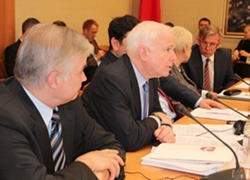US and EU politicians support strengthening sanctions against Lukashenka regime
72- 3.05.2012, 13:57

The situation in Belarus became a theme of active discussion at an international conference in the Lithuanian Seimas.
An international conference “The Role of Parliamentarians in Strengthening Eastern European Democracies: On the Road to Democratic Societies” is held in the Parliament of Lithuania on May 3. The conference focuses on democratization prospects, recent political developments and contemporary challenges, current issues and visions of international integration and cooperation in this region.
The conference is attended by US Senator John McCain, Speaker of the Lithuanian Seimas Irena Degutienė, head of the Committee on Foreign Affairs Emanuelis Zingeris, Lithuanian Foreign Minister Audronius Ažubalis, the first head of independent Belarus Stanislau Shushkevich, the first head of independent Lithuania Vytautas Landsbergis, one of the Russian opposition leaders Boris Nemtsov, head of the Committee on Foreign Affairs of the Polish Senate Włodzimierz Cimoszewicz, chairman of the Committee on European Integration of the Verkhovna Rada of Ukraine Boris Tarasyuk, Vice Speaker of the Georgian Parliament Gigi Tseriteli, coordinators of of European Belarus civil campaign Alyaksandr Atroshchankau and Pavel Marynich, editor of charter97.org website Natallia Radzina, heads of the United Civil Party and the Belarusian Christian Democracy party Anatol Lyabedzka and Vital Rymasheuski, head of the Commission on Foreign Affairs of the Polish Sejm Andrzej Halicki and others.
Seimas Speaker Irena Degutienė opened the conference and turned attention to the situation in Belarus:
“The main condition of restoring a dialogue with Lukashenka is the release and rehabilitation of political prisoners. The country also needs systematic changes, not show actions Lukashenka usually demonstrates to get loans from the West.”
Senator John McCain, a former US presidential candidate, noted it might seem the US did not pay proper attention to Eastern Europe, but it did not reflect the truth because his country and Europe were literally family with common commitments to the world.
McCain pointed at the problematic, in his opinion, countries of the former Soviet Union – Belarus, Ukraine, Moldova and Georgia.
He noted the United State remained committed to helping Belarus in its ongoing struggle for democracy. Lukashenka understands force and sanctions, the senator said adding that it's due to the sanctions that Andrei Sannikov and Zmitser Bandarenka were released after almost 18 months in prison. Internal and external pressure on Lukashenka should not weaken, the American politician marked.
Lithuanian Foreign Minister Audronius Ažubalis said speaking about Lithuania's chairmanship in the Organization for Security and Cooperation in Europe it was marked with closing the OSCE Office in Belarus at the beginning of the tenure.
The minister noted Belarus, Ukraine and Georgia would held parliamentary elections soon. “These countries need support at this time,” Ažubalis said.
“The last dictator of Europe uses his fists to rule in Belarus. It's obvious for us today the Belarusian regime should be condemned. Here only black or white colours are possible. The regime does not want to cooperate with the West, though the country has European heritage. The regime does not respect civil right and freedom, the opposition is being persecuted, independent media are being suppressed,” Stephen Nix, the Vice-President of the International Republican Institute (USA), said.
Włodzimierz Cimoszewicz, a former Polish PM and head of the Senate Commission on Foreign Affairs, noted human rights were completely ignored in Belarus.
Boris Nemtsov, the co-head of the Russian Solidarity movement, stressed “Lukashenkanization” of Russia started. “A scenario of 'Lukashenkanization' is being implemented in Russia. If we do nothing continuing to sit in our kitchens, we will find ourselves in the situation of Minsk.”
Evaldas Ignatavičius, Lithuanian Vice-Minister of Foreign Affairs, is confident Belarus and its people should have a European perspective. The Belarusian authorities are depriving Belarusians of this perspective, the vice-minister says.
“We should support the tough sanctions against Belarusian officials and be open to the people of Belarus,” Ignatavičius said.
Participants of the conference adopted a resolution with several paragraphs relating to Belarus.
“We condemn the Belarusian regime for persecution and imprisonment of the members of political opposition. We call on the authorities of Belarus to allow political parties and civil society to hold rallies and have access to media.
We call on the authorities of Belarus to release imprisoned opposition activists and stop torture.
We express our support to the USA and the European Union for strengthening political and economic sanctions against the Belarusian regime with the aim to release political prisoners and carry out democratic reforms,” the resolution says.















